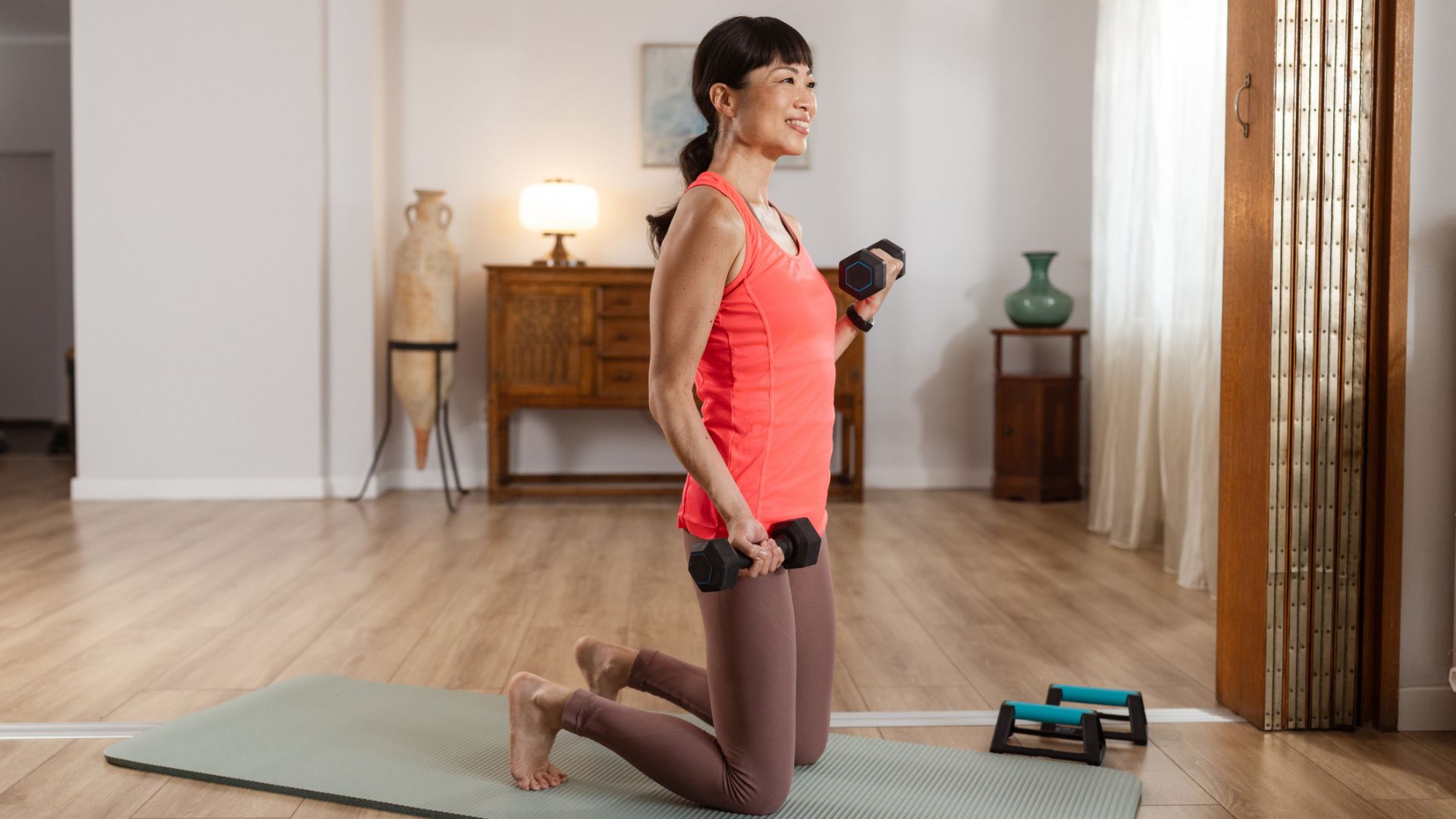14 winter health tips the experts swear by
Discover how to stay in prime health this (and every) winter with these expert-approved health hacks

Whether it’s wind and rain, chapped skin, coughs and sneezes or just that general rundown, “blah” feeling we get when summer seems a long away off, winter can play havoc with our health. Fear not, though, we have 14 expert-approved ways to make it through and still feel your best, from head to toe.
- Hearing tests: tell-tale signs you need one and what to expect
- Menopausal weight gain: everything you need to know
- The right supplements: For your 30s, 40s, 50s, 60s and beyond
1. Write down positive thoughts
“Research has revealed that feeling grateful boosts our happiness,” says psychologist Susan Scott. “Every evening I write down three things I’m grateful for, such as my train arriving on time, or how I made someone feel. Gratitude generates positivity, and this makes facing the dark, gloomy, chilly days of winter much more bearable. plus, it also helps switch off the stress response.”
2. Fend off the flu
Nurse Catherine Turner strongly advises us all to get our flu shots as early as possible in order to protect ourselves fully. It’s more effective to have it in the autumn, although it’s still beneficial mid to late winter.
In the US, flu vaccines are offered in many doctor’s offices, clinics, health departments, pharmacies and college health centers. Your employer or school may also offer shots. Meanwhile in the UK, you can have your NHS flu vaccine at your GP surgery, a local pharmacy offering the service or, if you’re pregnant, your midwifery service may offer it.
3. Protect your ears
General practitioner Dr Roger Henderson explains how the colder weather can contribute to the hardening of earwax: “Our bodies produce earwax to keep our ears clean. With earwax more likely to harden during winter, our ears are vulnerable to getting blocked, which can become painful.” To prevent a build-up of wax, he recommends Earex Advance Ear Drops.
4. Pump your probiotics
They’re known for increasing your gut health, but did you know probiotics could also help stop you from catching a cold? And, if you do catch a bug, probiotics may help reduce the severity of your symptoms and shorten how long they last. “Probiotics are thought to directly kill or inhibit the growth of harmful bacteria and stimulate your immune system,” says Chris Newbold, head of clinical nutrition at BioCare.
5. See the light
Sunshine always puts a smile on our faces, but it can put a spring in your step too. “Natural daylight stimulates the release of the happy hormone serotonin,” says Susan. “This increases positivity and motivation, and keeps your mood buoyant. Plus, in the evening, serotonin is converted to sleep hormone melatonin, so you’ll sleep more soundly too.” During the winter months, sunlight can of course be in short supply - so consider investing in one of the best SAD lamps to top up your levels.
Get the Fit&Well Newsletter
Start your week with achievable workout ideas, health tips and wellbeing advice in your inbox.
6. Wash those hands!
Thanks to coronavirus, we all know the drill by now. Wash your hands regularly and thoroughly for at least 20 seconds to scrub away all the bacteria you may have come into contact with. “Wash your hands for as long as it takes you to sing Happy Birthday twice,” says pharmacist Angela Chalmers.
7. Keep your joints moving
Exercise might not seem quite so appealing on freezing days, but working out in the winter is important. It gets the blood pumping, helping to circulate immune cells more quickly to seek and destroy infections. It also releases feel-good chemicals.
Experts at AXA PPP Healthcare recommend Nordic walking, which burns up to 46% more calories than walking without poles. The Nordic walking poles encourage you to work out through your body’s fullest range of motion – great for toning hips, bottom, thighs, abs, waist, arms and chest. For more info, check out our guide to walking to lose weight.
8. Take care of your eyes
The dry winter air can be tough on our eyes, so make sure you’re looking after your peepers. “Heating your house dries out the moisture in the air further, which can cause your eyes discomfort,” says optometrist Sona Thakerar. “One easy way to tackle this is to invest in a humidifier, which will emit moisture into the air and reduce this dryness, or pick up some lubricating eye drops.”
9. Get enough sleep
Research by the University of Pennsylvania has shown a direct link between sleep and your immune system. “Not only can lack of sleep compromise your immunity, but it can also increase the amount of time it takes for you to recover after a cold,” says nutritionist Julie Lamble. “Sleep experts recommend you get seven to eight hours per night.”
10. Eat the right foods
Comfort food may be top of the menu, but it doesn’t need to be unhealthy. Dietitian Lucy Jones suggests eating plenty of oily fish in the winter months as it’s both nutritious and low in fat. Need help reaching your RDI (recommended daily intake) of oily fish? Try a fish oil supplement. She also recommends switching red meat for tuna in hearty meals, or serving it with a jacket potato for a super-speedy winter warmer.
11. Try herbal teas and supplements
Winter is the perfect time to stock up on herbal remedies. “Research has found that lavender, camomile, lemon balm, ginkgo biloba, passion flower and valerian can all help to support your mood,” says Heath & Heather nutritionist Lily Soutter.
12. Guard against cold sores
The cold weather tends to increase the risk, especially if you’re prone to them anyway. But pharmacist Daniel Brash has some tips on how to avoid them. UV light is a very common trigger and can be strong even in winter, so to minimise that, make sure you regularly use a lip protector with at least SPF 15,” he says. “Don’t share make-up, drinking glasses or cutlery either. If you suffer badly, your doctor may be able to prescribe antiviral tablets.”
13. Care for your skin
“As humidity levels drop, skin becomes drier. Plus, changing temperatures can wreak havoc on your face, making it become red and sensitive,” says aesthetics expert Dr. Maryam Zamani. “Use an antioxidant serum rich in vitamin C to help protect your skin from UV damage, while also combating pigmentation.”
She also recommends using hyaluronic acid in moisturisers and serums. “It will help replenish lost moisture and provide minerals to rejuvenate skin while you sleep,” she says.
“You may need to change your cleanser to a more creamy one,” adds dermatologist Dr. Stefanie Williams. “Avoid foaming cleansers containing sodium lauryl sulphate and try products with omega-3 to help trap in moisture.”
14. Keep your home clean
As the weather starts getting steadily worse, we spend a lot more time indoors, so make sure you’re taking precautions and keeping your home healthy.
Airborne allergens expert Max Wiseberg suggests using a vacuum cleaner with a Hepa filter to avoid spreading the pollutants around, as well as keeping a large doormat outside the house and having a no-shoes policy inside. “If you keep the humidity down to 30-50%, this can help keep dust mites, mould spores and other allergens under control,” he adds.
“Also remember to open a window when cooking, bathing or running the dishwasher,” Max continues. “Don’t overwater houseplants, fix any annoying leaks and empty the drip tray of your humidifier – if you have one.”
Emily is a writer with plenty of experience in women’s lifestyle. She has written for titles including Now, Look, and Woman’s Own about health and fitness; from the ideal home workouts and combating everyday ailments to boosting your wellbeing and mental health. Fitness-wise, she has always enjoyed a healthy competition in netball or football, and is keen on her walking, running and spinning classes. Emily's top fitness tip? The best workout partner is an outstanding playlist - it'll help you power through those my-muscles-are-turning-to-jelly moments.
-
 Do your gut a favor with this dietitian's gut-friendly veggie-filled fried rice recipe
Do your gut a favor with this dietitian's gut-friendly veggie-filled fried rice recipeKeep your tummy happy with this flavorful twist on a favorite
By Lou Mudge
-
 I’m a personal trainer and these are some of my favourite exercises to build core and upper body strength at home
I’m a personal trainer and these are some of my favourite exercises to build core and upper body strength at homeAll you need is a set of dumbbells for this kneeling workout
By Maddy Biddulph

